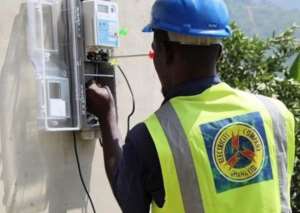
Civil Society Organisation, SEND Ghana has issued a press release to support Organised Labour’s demand for government to withdraw the 15% Value Added Tax (VAT) on electricity for residential customers.
“SEND GHANA stands in solidarity with organized labour and concerned citizens across the country in calling for the complete withdrawal of the 15% Value Added Tax (VAT) for residential customers of electricity above the maximum consumption level for lifeline consumers, whose consumption is limited to 30 kilowatt-hours per month,” part of a release from the CSO said.
Government as announced by the Ministry of Finance is seeking to raise more revenue by imposing a 15% VAT on all residential customers consuming above the lifeline of 30 kilowatt-hours.
Since the announcement last month, there has been strong opposition from politicians, analysts, as well as groups.
Organised Labour has particularly been vocal and warned to take action if government refuses to abolish the new VAT on electricity.
In its press release, SEND GHANA has called on the government to prioritise the welfare of citizens by heeding to the legitimate concerns raised by organised labour and immediately reverse the decision to impose a 15% VAT on electricity.
“We urge the Ministry of Finance to engage in meaningful dialogue with stakeholders, including workers' unions, civil society organizations, and the private sector, to explore alternative revenue generation measures that are equitable and do not place an undue burden on vulnerable populations,” SEND Ghana said in its press release.
Read the full release below:
Press Statement
For Immediate Release
Accra, Ghana -
SEND GHANA Stands in Solidarity with Organized Labour on the Complete Withdrawal of the 15% VAT Tax for Residential Customers of Electricity
SEND GHANA stands in solidarity with organized labour and concerned citizens across the country in calling for the complete withdrawal of the 15% Value Added Tax (VAT) for residential customers of electricity above the maximum consumption level for lifeline consumers, whose consumption is limited to 30 kilowatt-hours per month.
We acknowledge the importance of the government’s Medium-Term Revenue Strategy and the IMF Post COVID-19 Program for Economic Growth (PC-PEG). However, we believe that this should not be achieved at the expense of the most vulnerable segments of our society. The implementation of the 15% VAT tax on residential electricity consumption will burden and undermine the welfare of ordinary Ghanaians who are already grappling with multiple hardships and economic challenges. This tax will further exacerbate the financial strain on households, particularly those with limited income, by increasing their utility bills and reducing their disposable income. Access to affordable electricity is crucial for supporting livelihoods, enhancing the quality of life for all citizens and ultimately for driving economic growth.
There have been some media reports stating that after a cabinet meeting on Friday, February 2, 2024, the government has decided to cancel the 15% VAT on residential electricity. However, we are concerned that we have not seen any official statement to that effect, hence, we cannot rely on it. If indeed what we are hearing from a section of the media is true, we expect a formal communication from the Ministry of Finance or the President to that effect.
SEND GHANA as a matter of urgency calls on the government to prioritize the welfare of citizens by heeding to the legitimate concerns raised by organised labour and immediately reverse the decision to impose a 15% VAT on electricity. We urge the Ministry of Finance to engage in meaningful dialogue with stakeholders, including workers' unions, civil society organizations, and the private sector, to explore alternative revenue generation measures that are equitable and do not place an undue burden on vulnerable populations. As an organization committed to advocating for social justice and inclusive development, we will continue to work alongside key stakeholders to champion policies that promote the well-being and prosperity of all Ghanaians.





 Election 2024: We have robust machinery to deal with NPP’s rigging mechanisms – ...
Election 2024: We have robust machinery to deal with NPP’s rigging mechanisms – ...
 Bawumia's choice of running mate is part of the mess – Bernard Mornah
Bawumia's choice of running mate is part of the mess – Bernard Mornah
 Ambulance case: Traditional rulers from Central Region storm court to support At...
Ambulance case: Traditional rulers from Central Region storm court to support At...
 Lil Win’s accident case: We’re awaiting AG’s advice – Prosecution tells court
Lil Win’s accident case: We’re awaiting AG’s advice – Prosecution tells court
 Free SHS Bill Consideration: We're hearing from Majority Leader for the first ti...
Free SHS Bill Consideration: We're hearing from Majority Leader for the first ti...
 NPP running mate: Napo’s temperament cannot be measured - Political Analyst
NPP running mate: Napo’s temperament cannot be measured - Political Analyst
 NPP’s claim of ‘we’ve the men’ proven to be false; Bawumia not the economist you...
NPP’s claim of ‘we’ve the men’ proven to be false; Bawumia not the economist you...
 Why did SSNIT accept Rock City’s US$61million off-the-mark bid? — Ablakwa hits ...
Why did SSNIT accept Rock City’s US$61million off-the-mark bid? — Ablakwa hits ...
![Prof. Jane Naana Opoku Agyemang [File Photo]](https://cdn.modernghana.com/content__/84/56/627202422033-i41p266ffa-professor-jane-naana-opoku-agyemang-is-running-mate-of-former-president-mahama.jpg) If you have evidence of Mahama saying he will cancel Free SHS bring it – Naana O...
If you have evidence of Mahama saying he will cancel Free SHS bring it – Naana O...
 Appeals Court hasn't thrown out application against contempt ruling — Rev Kusi B...
Appeals Court hasn't thrown out application against contempt ruling — Rev Kusi B...
